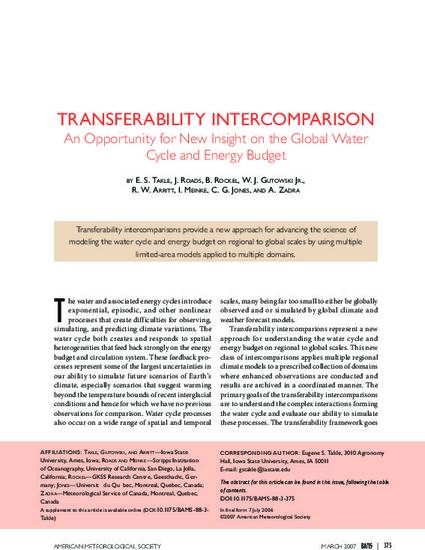
A new approach, called transferability intercomparisons, is described for advancing both understanding and modeling of the global water cycle and energy budget. Under this approach, individual regional climate models perform simulations with all modeling parameters and parameterizations held constant over a specific period on several prescribed domains representing different climatic regions. The transferability framework goes beyond previous regional climate model intercomparisons to provide a global method for testing and improving model parameterizations by constraining the simulations within analyzed boundaries for several domains. Transferability intercomparisons expose the limits of our current regional modeling capacity by examining model accuracy on a wide range of climate conditions and realizations. Intercomparison of these individual model experiments provides a means for evaluating strengths and weaknesses of models outside their “home domains” (domain of development and testing). Reference sites that are conducting coordinated measurements under the continental-scale experiments under the Global Energy and Water Cycle Experiment (GEWEX) Hydrometeorology Panel provide data for evaluation of model abilities to simulate specific features of the water and energy cycles. A systematic intercomparison across models and domains more clearly exposes collective biases in the modeling process. By isolating particular regions and processes, regional model transferability intercomparisons can more effectively explore the spatial and temporal heterogeneity of predictability. A general improvement of model ability to simulate diverse climates will provide more confidence that models used for future climate scenarios might be able to simulate conditions on a particular domain that are beyond the range of previously observed climates.
Available at: http://works.bepress.com/eugene-takle/39/

This article is from Bull. Amer. Meteor. Soc., 88, 375–384. doi: http://dx.doi.org/10.1175/BAMS-88-3-375. Posted with permission.